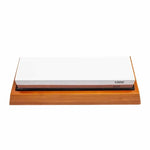How to clean rust off a kitchen knife

Rust is the worst enemy of any metal, and it's the most serious problem with metal knives. Many people discard their knives as soon as they notice a couple of rust spots, believing that they are no longer usable. Rust, on the other hand, can be cleaned, especially if it is only beginning to emerge on the blade.
But, before we talk about solutions, let's talk about prevention: Rust is mostly caused by water and dampness. Steel knives should never be left in the sink for too long, and they should never be washed in the dishwasher. If you fully dry your steel knives after washing them, you will have no rust problems for a long time. Rust is a natural occurrence for metals, but you'll want to protect your steel blades from it as much as possible.
Let's have a look at how to remove rust from a kitchen knife.
1. With Baking soda
Baking soda can clean a variety of items, including rust. Cleaning rusty knife blades with baking soda paste is a tried and true procedure that has worked for a variety of knives. So at the very least, give it a shot for your rusted knife.
All you need:
- Water
- Baking soda
- Toothbrush
- Sponge
- Steel wool
- Cloth
Directions:
- Clean the knife: First things first, you will need to clean your knife because dirt tends to involve in the process of rusting. Clean your knife with a cleaning product and wipe it off with a cloth. Don’t use water to wash the knife because, as we just addressed, water is the main reason that a knife’s blade rusts.
- Make a baking soda paste: Next, you need to make the paste, which is very easy; just pour a fair amount of baking soda into a bowl and add some water or lemon juice. Stir it up until it becomes a paste.
- Scrub the blade: Here the toothbrush comes in handy. Apply the thick paste to a toothbrush and liberally spread it across the blade. But remember that you can scrub with a toothbrush only if the rust isn’t too severe or set in.
- Scrub with steel wool: If the blade is extremely rusty you will need something that provides more abrasion to remove it. Steel wool is a perfect candidate for that work, but remember that it can ruin your blade if you scrub too hard.
- Scrub with a sponge: Another less damaging way to clean the blade from rust is scrubbing it with a slightly abrasive sponge.
- Wipe the blade: And lastly, clean the baking soda off the blade with a cloth.
2. With a potato
This might sound funny to you, but it actually works. Raw potatoes contain oxalic acid, which is able to dissolve rust from blades. This method is the easiest of them all, which is perfect if you don’t have much time to spend on cleaning rust.
All you need:
- Raw potato
- Cloth
Directions:
- Stab the rusty knife into a potato.
- Leave it like that for a few hours.
- Remove the knife.
- Rinse the juices off the blade.
- Dry the blade with a clean cloth.
- Throw the damaged potato away because it is not eatable any more.
3. With oil
Applying a light oil that will not stain or dry the metal components to a blade can remove light rust stains.
All you need:
- Oil
- Cloth
- Steel wool
Directions:
- Apply the oil: Take a clean cloth and apply a thin layer of oil to the blade directly. Use a very little amount of because it can attract dust and debris.
- The wait: Leave the knife open for two or three days. The oil will soak into the blade and it will loosen up the rust spots making them easier to remove.
- Clean it: After three days, take a piece of steel wool and carefully remove the rust.
4. With Lemon and Salt
The combination of the acidity of the lemon with the abrasiveness of the salt can be very effective in completely removing small rust spots.
All you need:
- Lemon
- Salt
- Steel wool
- Cloth
Directions:
- Covering: Cover the rusted areas of the blade with salt and squeeze lemon juice all over the layer of salt.
- The wait: Let the knife soak in the mixture for about 2 hours.
- Scrub it off: Scrub the blade with a piece of steel wool to get rid of the spots.
- Clean it: Rinse the knife with some warm water and dry it with a clean cloth. Never leave the knife underwater for a long time; moisture can be the main reason your knives get rusty.
5. With CLR
CLR is a tested cleaner that removes calcium, lime, and most importantly, rust from any metal surface, which includes knife blades. But it also has its cons, so here are a few things that you need to remember:
- Clean your knife in a well-ventilated area or preferably outside, and use gloves when handling CLR because it is a caustic substance.
- Make sure to not mix CLR with other cleaners, because that can cause a dangerous reaction.
- Also, don’t use CLR on galvanized metal, Because it might cause spotting on the zinc coating of the blade.
All you need:
- CLR
- Gloves
- Cloth
- Warm water
Directions:
- Make the mixture: Start off by mixing a solution of half CLR and half warm water.
- Dip the blade: Dip the blade of your knife into the mixture and make sure that the CLR doesn't touch the handle if it is not made out of metal because it will damage it.
- Wash it: Keep the blade in CLR for exactly 2 minutes and not more. Rinse the blade immediately after with cold water.
You can use CLR at full strength without diluting it with water and rinsing it immediately after with cold water in case if stains of your blade are persistent.
Finally, if your knife is completely rusted to the point that nothing will help, you will need to replace it with one that will last a long time and will not rust prematurely. But, just in case, keep in mind that you have these options for preventing your blades from becoming rusted to the point of being uncleanable.
































